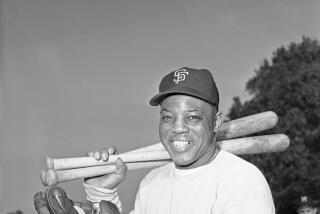A consumer’s guide to the best and worst of sports media and merchandise. Ground rules: If it can be read, played, heard, observed, worn, viewed, dialed or downloaded, it’s in play here.
- Share via
What: The Bill James Guide to Baseball Managers from the 1870s to Today.
Price: $30.
He may not take this as warmly as I mean it, but here goes: Beyond the heaps of statistics, the esoteric and, as continued in this volume, his traditional contempt for most of the profession, Bill James is a great sportswriter. Maybe one of the most influential sportswriters of our times.
With his “Baseball Abstracts” of the early 1980s, James re-created baseball analysis, turned it on its heel and wrote with a vigor that begged you to just try to prove him wrong.
That is what great sportswriting is supposed to be--determined to stir up a little trouble, comprehensively researched, and constantly willing to peer past the exhausted cliches and this-is-right-because-it’s-the-way-it’s-always-been-done fallacies.
Having dumped over the apple cart, James doesn’t write as much nowadays, and when he does, it reads a little scattershot. Which brings us to this book.
The best and worst thing I can say about it is that it’s probably the only piece of writing that both defends Marge Schott’s freedom of speech and analyzes the development of the sacrifice bunt, and that mentions Yogi Berra and Joe Altobelli the same number of times, six.
In the middle of the book, James tries to fashion a methodology for ranking managers on an all-time list, and comes up with Joe McCarthy, John McGraw and, gulp, Bobby Cox as his top three.
But James doesn’t really seem to have his heart in the formula. He’s more interested in--and best at--finding patterns, identifying how personality affects decision-making and performance, and tracing the history of the game through the cranky men who fill out the lineup cards and decide when to play hit-and-run.
“All major league managers, essentially, come from one of three families,” James writes in his confident, compelling manner, “the Connie Mack family, the Branch Rickey family, and the Ned Hanlon family.”
Even if you have no idea who Ned Hanlon was, are you going to argue with him?
More to Read
Go beyond the scoreboard
Get the latest on L.A.'s teams in the daily Sports Report newsletter.
You may occasionally receive promotional content from the Los Angeles Times.










